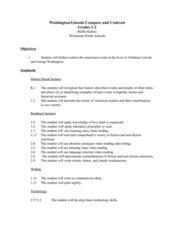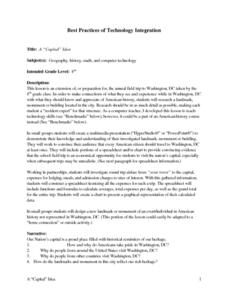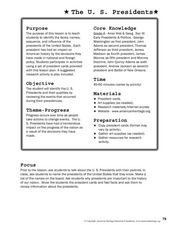Curated OER
Discovering the Physical Geography of Washington
Students develop a mental map of the state of Washington and draw it on paper. Using the Virtual Atlas, they identify the physical features of the state and draw them on their map. They also examine the populations and diversity of the...
Curated OER
Portraits Of Power: American Presidents
Students discover the responsibilities of the presidency. In this U.S. government lesson, students watch "Portraits Of Power: American Presidents," and then compose essays regarding the citizens' relationship to the presidency.
Curated OER
President Madison's 1812 War Message: A Documentary Review
Students analyze primary documents to determine why President Madison believed it was important for the US to declare war with Great Britain. Students research documents on the Internet to determine President Madison's argument for going...
Curated OER
George Washington and the Rule of Law
students compare The rule of law with the rule of men and consider life under each of these types of governments.In this government lesson, students read a primary source to examine the importance of the rule of law.They will also answer...
Curated OER
The Monroe Doctrine: President Monroe and the Independence Movement in South America
Students identify conditions in Europe that relate to the independence movements in South America and list reasons why President Monroe gave for recognizing the independence movement in South America.
Curated OER
Washington/Lincoln Compare and Contrast
Students examine the lives of George Washington and Abraham Lincoln. Using the information, they complete a Venn diagram discovering what the two men had in common. In groups, they review a timeline made in an earlier lesson and view a...
Curated OER
Dropping (and Adding) Names in Washington
Students research and create profiles of key figures in the current administration and those people who are speculated to play a role if George W. Bush is re-elected in the 2004 election.
Curated OER
Why a President? Why not a King?
Young scholars research how and why a country elects to have an executive branch of the government. They study the office of the Presidency of the US.
Curated OER
Ten Crucial Days-How to Win a War You Should Lose
Students research the victories of Washington at Trenton and Princeton. In this Revolutionary War lesson plan, students investigate and discuss the factors of Washington's victories and use maps to identify the strategy Washington used....
Curated OER
Get to Know Your Bill of Rights
Sixth graders research and examine the first ten amendments to the Constitution of the United States of America. They sequence events significant to this time period, read and discuss text, and in small groups prepare and present the...
Curated OER
A "Capital" Idea
Eighth graders prepare for a field trip to Washington, DC by researching landmark, monument, or building in Washington. They use the information in small groups to design a multimedia presentation. They include a spreadsheet that shows...
Curated OER
Listening for Leschi: Voices from the Past
Students explore the written and oral histories of mid 19th centruy western Washington. They imagine that they are a reporter who can travel back in time and interview Leschi to create a newspaper article that features him.
Curated OER
Who is the President Now?
Students discover the presidents of the United States using digital tools. In life skills lesson, students use PowerPoint and SMART Board technology to match presidents of the United States to their photographs.
Curated OER
Presidents
Young scholars identify the qualities needed to become President of the United States. Using the internet, they discover the differences in character of past presidents and draw conclusions about their time in office. They relate a...
Curated OER
Roles of the President
Middle schoolers read a document which explains the roles and responsibilities of the President of the United States. In groups, they tour the George Bush Presidential Museum and participate in a Presidential scavenger hunt. Once back...
Curated OER
The U.S. Presidents
Students identify the Presidents of the U.S. by their physical characteristics and their impact on America. In this Presidents lesson plan, students read about each President, look at their pictures, and identify each of them based on...
Curated OER
Washington's Encampment at Fredericksburgh
Seventh graders examine George Washington's encampment at Fredericksburgh and the events that occured while he was there.
Curated OER
"Declaration of Independence" From Plagiarism
So, what does the Declaration of Independence even mean? Learners of all ages paraphrase the Declaration of Independence in modern terms. They work as a group or class to paraphrase the language of the Declaration of Independence. There...
Curated OER
President's Day: George Washington
Students celebrate President's Day by studying George Washingtion, the US flag, and the American colonies. They sing, Yankee Doodle Dandy.
Curated OER
Frederick Douglas and Abraham Lincoln
Students discuss the significance of the announcement of the Emancipation Proclamation and the assassination of Lincoln. They analyze how historians use evidence and develop differing interpretations. Students examine historical bias and...
Curated OER
VS.6a
Sixth graders explore, discuss and explain why George Washington is called the "Father of our Country" and James Madison is called the "Father of the Constitution." They view and create a graphic organizer after discussing a variety of...
Curated OER
GroWing Up
Students investigate a short biography of George Washington's childhood. They examine the differences between life for students in the eighteenth century and today.
Curated OER
Letters
Students read letters the could have been written by Robert E.Lee and his friend John giving students an ideas of what students from a different era thought of George Washington. They discuss history from a child's view point.
Curated OER
The Colony of Virginia as Far as the Mississippi
Students study George Washington's map and journal of his 1754 expedition to the French. They draw conclusions about the importance of western lands and the problems involved in tapping the resources of the West during that era.

























